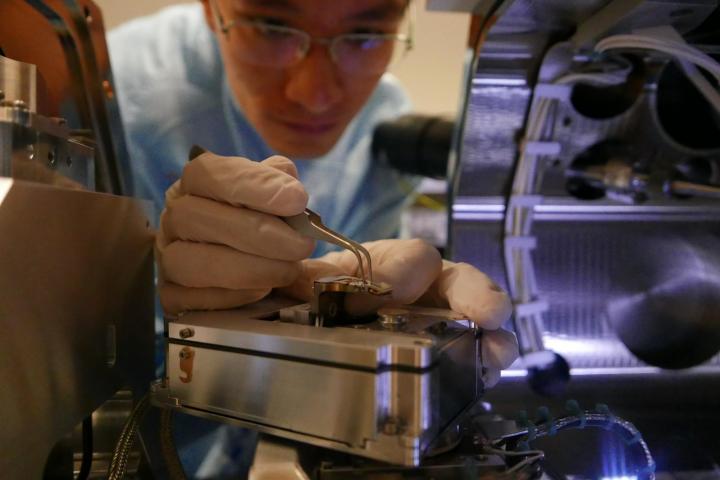
The main objective of the project entitled "TACOM - Development of correlative AFM and SEM/AirSEM microscope" is to expand the commercial use of correlative AFM and SEM microscopy in the scientific and industrial communities. This vision is based on the large market potential and demand identified through market research and the experience of scientific teams. The project consists of two main pillars. Under the first pillar, scientists will focus on the further development of correlative imaging probes and AFM and SEM techniques. The second pillar focuses on the development of the globally unique Tabletop AirSEM tool and its integration with the AFM system. An important part of the project is to strengthen the cooperation between the Czech and Korean teams in order to establish a long-term collaboration on a commercial and scientific level. The main outcome of the project will be the opening of two complementary reference laboratories for correlative microscopy on the Korean and Czech side.
NenoVision and COXEM are highly active and innovative companies that are focused on providing high-tech solutions and products to microscope users worldwide. COXEM is well established in the scanning electron microscope (SEM) market and NenoVision is a start-up company specializing in the integration of atomic force microscopy (AFM) into SEM. Both companies expect to help address current industry and scientific research requirements by appropriately designing and developing new products and methods in AFM-SEM microscopy, including validation and promotion of their capabilities, in collaboration with academic partners, which will also lead to a better position of both companies in the global market in the long term.
"NenoVision intends to strengthen cooperation in the field of correlative microscopy with Korean and Czech academic and industrial partners and to accelerate the development of our business activities using the results of the project. We expect to improve the performance and capabilities of our LiteScope product through increased resolution, sensitivity and application of innovative data acquisition and processing algorithms presented in various application examples in Czech and Korean reference laboratories," said Jan Neuman of NenoVision.
"In this project, COXEM wants to design and implement a new type of electron microscope that can be used in promising emerging fields. Specifically, COXEM intends to develop a correlative AirSEM and AFM microscope for observing live samples outside the vacuum chamber. COXEM's role in this project is to develop a new integrated measurement system and verify its function and operation up to the pre-commercialization stage," said Junhee Lee of COXEM.
The Korea Institute of Science and Technology (KIST) will also play an important role in the project. "KIST will develop a 2D boron nitride (BN) membrane to replace the Si3N4 membrane used in the AirSEM developed by COXEM for electron passage to/from the vacuum chamber. At the same time, KIST will develop a technique to transfer BN to this passage window," explained Dong Su Lee of KIST. "In addition, a SEM-AFM reference laboratory will be established at KIST, as it intends to strengthen cooperation with Czech partners in the project."
As academic partners, researchers from the Faculty of Electrical Engineering (FEL) of CTU, which excels in combining computer science and electrical engineering at a high level, are participating in the project on the Czech side. "Based on our expertise and long-term experience, the new and improved types of SEM-AFM correlative microscopes are much needed and will be a great asset for research and development focused on current applications ranging from photovoltaics to biosensors and life sciences," said Prof. Bohuslav Rezek from FEL CTU. His team will contribute to the project by establishing a reference laboratory, designing and testing specific nanomaterials and life sciences samples, developing innovative AFM modes, improving the performance of AFM probes, and testing and providing feedback on the performance of correlative SEM-AFM and AirSEM-AFM techniques, including high-resolution measurements.
"As part of the project, JBNU intends to strengthen cooperation with companies and academic partners in Korea and the Czech Republic in the development of a comprehensive AFM combined (Air)SEM including correlative image analysis," said Sangmin An of JBNU. The team from JBNU, specifically researchers from the Department of Physics, will contribute to the project by exploring nanomaterials and nanotechnology fabrication through advanced AFM modes, implementation of new types of AFM, high-resolution measurements and image analysis in SEM-AFM systems.
The total estimated cost of the project is 2,434,537 USD (50 million CZK). The main financial support for the project is from the Technology Agency of the Czech Republic under the TREND programme in the amount of 688,709 USD (17.2 million CZK) and from KIAT (Korea Institute for Advancement of Technology) in the amount of 1,327,428 USD (33.1 million CZK). The total duration of the project is planned for 36 months.